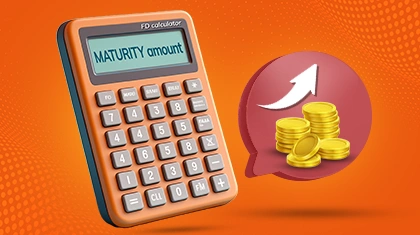THE
ORANGE
HUB
Key Fixed Deposit Rules and Regulations

Fixed Deposits (FDs) have long been a preferred investment option for risk-averse investors seeking steady returns. As a time-tested financial instrument, FDs offer the assurance of fixed interest rates and the safety of capital.
However, before diving into this secure investment option, it is crucial for investors to be aware of the key regulations or certain FD rules. With this comprehensive guide, you will be well positioned to grasp the essential FD regulations set forth by the Reserve Bank of India (RBI).
Two Types of FDs
ICICI Bank customers can opt for two types of FDs based on how they wish to receive interest.
● Regular/Traditional - The payable interest can be received monthly or quarterly. The maturity period ranges from 7 days to 10 years.
● Reinvestment - In this FD, the interest is compounded quarterly and reinvested with the principal amount. The maturity period ranges from 6 months to 10 years.
Key Provisions for ICICI Bank FDs
ICICI Bank Fixed Deposit can be opened from 7 days to 10 years. You can avail of FDs with a minimum deposit of just Rs 10,000 (for General Customers) and only Rs 2,000 (for Minors).
Partial withdrawal is allowed in units of Rs 1,000. The balance amount will continue to earn the given rate of interest. Do not forget to keep your FD receipts safe. An auto-renewal facility is also provided. Depositors can avail loans of up to 90% of principal and accrued interest.
Check interest rates on ICICI Bank FDs.
General Regulations Governing Fixed Deposits in India
Here’s a set of regulations that cover, govern and determine FDs.
● Minimum and Maximum Deposit Amount: The RBI has mandated specific guidelines regarding minimum and maximum FD amounts. While banks often set their thresholds, it is crucial for investors to be aware of these limits to avoid any complications. Typically, the minimum deposit amount ranges from Rs 1,000 to Rs 10,000, depending on the bank. On the other hand, there is no maximum limit for FDs, allowing investors to park substantial amounts.
● Tenure and Premature Withdrawal: FDs are known for their fixed tenures, ranging from 7 days to 10 years or more. However, if investors need urgent access to funds before the maturity period, premature withdrawal is allowed. Banks charge a penalty for premature withdrawals and reduce the interest rate applicable to the deposit. Therefore, investors should carefully consider the necessity of liquidity before opting for such withdrawals.
● Interest Rates: The interest rates offered on FDs are determined by banks and RBI monetary policies and they fluctuate over time. Banks offer various interest rate options based on the tenure of the deposit and the type of investor (regular, senior citizen etc.). ICICI Bank offers higher interest rates to senior citizens who open FDs. It is vital for investors to compare interest rates among different banks to maximise returns.
● Tax Implications: Interest earned on Fixed Deposits is subject to Income Tax as per the individual's tax slab. For investors falling under higher tax brackets, this can affect the overall returns. However, banks also offer Tax-Saver FDs providing tax benefits under Section 80C of the Income Tax Act.
● Nomination Facility: RBI mandates that all FD Accounts have a nomination facility. The nomination process is simple and crucial to ensure a smooth transfer of funds to the nominee
● Thenomination facility available for ICICI Bank FDs mandates only one nominee per Deposit Account
● A parent or legal guardian can operate a Minor's Account and file a nomination on behalf of the minor. Nomination details can be changed during the Account relationship by filling up the Form prescribed under the Banking Companies (Nomination) Rules 1985.
● Tax Deducted at Source (TDS) on Interest Income: FD interest income is subject to TDS if it exceeds Rs 40,000 for regular investors and Rs 50,000 for senior citizens in a financial year. Investors need to provide accurate PAN details to avoid higher TDS deductions. Additionally, investors can submit Form 15G/15H to avoid TDS deductions if their total income is below the taxable threshold.
● Auto-Renewal and Maturity Proceeds: Investors should be aware of the auto-renewal facility provided by banks, wherein the FD is automatically renewed at maturity for the same tenure. If an investor wishes to change the tenure or withdraw the proceeds at maturity, they must inform the Bank in advance.
Basic Eligibility Requirements
FDs are available to just about everyone, from minors to senior citizens, anyone can open an Account.
Simple set of documents that a depositor needs to open an FD Account:
● Passport
● PAN Card
● Voter ID Card
● Driving License
● Aadhaar Card
● Photo ration Card
● Senior citizen ID Card
Address proof verifying residence in India:
● Passport
● Utility Bills
● Bank Statement with Cheque
● Certificate/ ID Card issued by Post Office
Accessible and Available to Everyone
FDs are a secure and reliable investment option that offers assured returns to investors. However, knowing the key regulations and rules surrounding FDs is essential. By understanding these regulations, investors can confidently navigate the world of FDs and make prudent decisions that best align with their goals. Whether it's the minimum deposit amount, premature withdrawal penalties or tax implications, staying informed ensures investors maximise their returns and secure their financial future.
T&Cs.
Scroll to top














